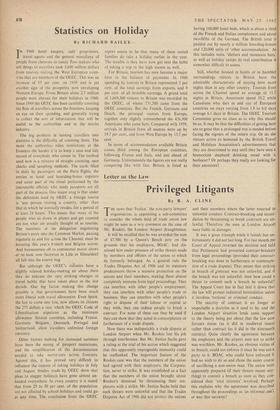Letter 01 the Law
Privileged Litigants
CLINE By R. A.
THE news that 'Justice,' the non-party lawyers' organisation, is appointing a sub-committee to consider the whole field of trade union law might be seen as a wry comment on the case of Mr. Rookes, the London Airport draughtsman.
It will be recalled that he was awarded the sum of £7,500 by a Queen's Bench jury on the grounds that his employers, BOAC, had dis- missed him under pressure of strike threats made by members and officers of the union to which he formerly belonged. As a general rule the Trades Disputes Act of 1906 and its statutory predecessors throw a massive protection on the unions and their members, making them almost completely immune from legal proceedings. They can interfere with other people's employment; they can interfere with other people's trade or business; they can interfere with other people's right to dispose of their' labour or capital as they wish; they can induce people to break a contract. For none of these can they be sued if they can show that they acted in contemplation or furtherance of a trade dispute.
Now there was indisputably a trade dispute at London Airport when Mr. Rookes lost his job through interference. But Mr. Justice Sachs gave a ruling at the trial of his action which suggested that this apparently impregnable immunity could be outflanked. The important feature of the Raokes case was that the members of the union had agreed with their employers, the Corpora- tion, never to strike. It was established as a fact that the members of the union brought about Rookes's dismissal by threatening their em- ployers with a strike. Mr. Justice Sachs held that such threats were unlawful and that the Trades Disputes Act of 1906 did not protect the unions and their members where the latter resorted to unlawful conduct. Contract-breaking and intimi- dation by threatening to break contracts are un- lawful. Therefore the men at London Airport were liable in damages,
It was a great triumph while it lasted, but un- fortunately it did not last long. For last month the Court of Appeal reversed the decision and held that Parliament had protected contract-breakers from legal proceedings (provided their contract- breaking was done in furtherance or contempla- tion of a trade dispute). That meant that striking in breach of pontract was not unlawful, and if the breach was not unlawful, then how could a threat to commit such a breach be unlawful? The Appeal Court has in fact laid it down. that the law will protect industrial intimidation unless it involves `tortious' or criminal conduct.
The sanctity of contract is no longer as respectable a doctrine as it used to be, and the London Airport situation lends some support to the theory being put about that the law now favours status (as it did in medieval times) rather than contract (as it did in the nineteenth century). Quite clearly the agreement between the employers and the airport men not to strike was worthless. Mr. Rookes, an obvious victim of its breach, could not enforce it since he was not a party to it. BOAC who could have enforced it had no wish to do so and chose the easier course of sacrificing a non-union man. The union were apparently prepared (if their threats meant any- thing) to commit a breach as soon as they con- sidered their 'vital interests' involved. Perhaps this explains why the agreement was described throughout the proceedings as 'an informal one'; or was that sarcasm?






































 Previous page
Previous page